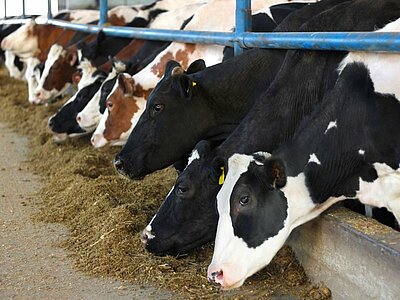General

Feed of non-animal origin or feedingstuff means any substance or product, including additives, processed, partially processed or unprocessed intended to be used for feeding animals. Particular feedingstuffs, compound feed, feed additives, premixtures and other substances are used as feed for animals which are reared either for human consumption or for their fur or which are kept in zoos, circuses or as pets etc. The control of safety and quality of feed of non-animal origin comprises also the control of genetically modified feed.
The quality of animal feed means that the animal feed placed on the market complies with the following conditions:
- it is produced in the prescribed manner;
- its traceability is guaranteed;
- it is labelled and packaged in the prescribed manner;
- it is not expired;
- it is transported and stored in the prescribed manner;
- it complies with the requirements regarding the composition and characteristics;
- it is of the labelled quality;
- authorised additives and products are used in prescribed amounts as direct or indirect sources of proteins.
The feed safety means that the feed complies with the safety conditions mentioned in the Animal Feed Act, with the regulations regarding veterinary compliance measures, the EU regulations and national feed regulations
The procedure for importing feed of non-animal origin from third countries varies depending on the risk that the feed poses in terms of safety and quality.
The import of feed of non-animal origin, which constitutes a more serious risk to animal and human health is subject to increased official controls. Increased control is performed on the feed of non-animal origin listed in Commission Implementing Regulation (EU) 2019/1793, and the feed subject to emergency measures according to Article 53 of Regulation (EC) No 178/2002. Such consignments of feed may enter the EU territory only at designated border control points (BCP) where they must be declared to a competent authority - in Slovenia the official border veterinarians of the Administration for Food Safety, Veterinary Sector and Plant Protection (hereinafter referred to as: the UVHVVR), who performs the necessary controls. Such consignments must be notified to the competent authority via the TRACES NT electronic information system before arriving at the BCP. After having performed an inspection, the competent UVHVVR inspector issues and certifies a Common Health Entry Document (CHED-D), which must also be attached to the customs declaration for the selected customs procedure.
Import control of consignments of the feed of non-animal origin, which is not subject to increased controls, is carried out by the customs authorites. Entry of such consignments to the Union territory is not limited to BCP¢s. Control of feed compliance with the regulations is performed when the goods are submitted for the customs procedure of release for free circulation. When submitting the customs declaration, the importer or his representative must declare the consignment by entering the prescribed code in the customs declaration. Customs authorities can perform only documentary and identifty checks, while they are not competent to perform physical inspections of feed. If the customs suspect that the goods do not comply with the feed regulations, they inform the UVHVVR inspector about their findings. If the consignment is submitted to the UVHVVR inspector, a customs authority must take into account in his further actions the measures adopted by UVHVVR inspector.
Legislation
EU legislation
Regulations
- Regulation (EC) No 178/2002 laying down the general principles and requirements of food law, establishing the European Food Safety Authority and laying down procedures in matters of food safety
- Regulation (EC) No 183/2005 laying down requirements for feed hygiene
- Regulation (EU) 2017/625 on official controls and other official activities performed to ensure the application of food and feed law, rules on animal health and welfare, plant health and plant protection products, amending Regulations (EC) No 999/2001, (EC) No 396/2005, (EC) No 1069/2009, (EC) No 1107/2009, (EU) No 1151/2012, (EU) No 652/2014, (EU) 2016/429 and (EU) 2016/2031 of the European Parliament and of the Council, Council Regulations (EC) No 1/2005 and (EC) No 1099/2009 and Council Directives 98/58/EC, 1999/74/EC, 2007/43/EC, 2008/119/EC and 2008/120/EC, and repealing Regulations (EC) No 854/2004 and (EC) No 882/2004 of the European Parliament and of the Council, Council Directives 89/608/EEC, 89/662/EEC, 90/425/EEC, 91/496/EEC, 96/23/EC, 96/93/EC and 97/78/EC and Council Decision 92/438/EEC (Official Controls Regulation)
- Commission Implementing Regulation (EU) 2019/1793 on the temporary increase of official controls and emergency measures governing the entry into the Union of certain goods from certain third countries implementing Regulations (EU) 2017/625 and (EC) No 178/2002 of the European Parliament and of the Council and repealing Commission Regulations (EC) No 669/2009, (EU) No 884/2014, (EU) 2015/175, (EU) 2017/186 and (EU) 2018/1660
- Commission Implementing Decision of 22 December 2011 on emergency measures regarding unauthorised genetically modified rice in rice products originating from China and repealing Decision 2008/289/EC
- Commission Implementing Regulation (EU) 2020/1158 on the conditions governing imports of food and feed originating in third countries following the accident at the Chernobyl nuclear power station
National legislation
Acts
Decrees
- Decree implementing the Decrees of European Community regarding feed and official inspection of feed
- Decree implementing the Regulation (EU) on official controls and other official activities concerning food, feed, animal health and welfare, and plant health and plant protection products
 REPUBLIC OF SLOVENIA
REPUBLIC OF SLOVENIA